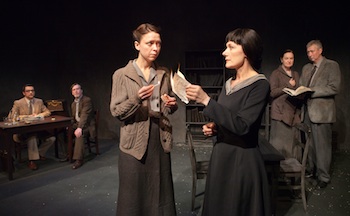By Winston Soon

After Akhmatova was performed in the Tarragon Theatre, Extra Space.
Last night I went to go back in time, and back in time some more with Tarragon Theatre’s resident playwright Kate Cayley’s Canadian premier of After Akhmatova.
Those of us who remember the collapse of the Soviet Union remember being children who feared the Soviets. If you are as old as me, you might remember Gregory Hines trying to defect somehow through tap dancing in the movie White Nights or Sting’s slightly ignorant anthem “Do the Russians love their children too?”
I actually remember lying in bed at night, dreaming that one day I would meet a Russian. I would show them what Levis were and let them listen to Taylor Dane and eat a Twinkie. Yes, I was a child of the 80s.
I share this with you because it is so easy to forget the insular, the big brotherness of the Soviet Union in today’s post-Soviet world. The fear we had that they would attack, the sadness we had for the people.
After Akhmatova is a story about Stalin, Russia, and the great poet Anna Akhmatova. I know nothing of her and precious little about Russia at that time. But the play does strike an archetypal cord. The idea of losing your freedom, losing loved ones to a work camp, and living in a fear so great that you must burn your writing in case a solider storms your house.
Alan is a young American of Russian descent who in 1968 travels to Soviet Leningrad to interview Lev, a Soviet propaganda specialist who is also the son of the famous poet, Anna Akhmatova. The play fluctuates between Lev’s interview as an older man and Alan and Lev’s arrival at his mother’s house as a young boy. It focuses on Akhmatova’s famous anti –Stalinist poem, “Requiem,” where Lev is mentioned. This research is the reason for Alan and Lev’s interview.
It is interesting to watch a play that is largely about the creation of a poem, and the backdrop that brought the poem into creation. I’ll be honest, I wanted to like this play more than I did. My actor and scholar friend watching the show with me (Ryan) said it best: “It looks like we are watching the Summerworks version of the play.” I would agree. To me, the play seemed under-gelled. There were some obvious line flubs and those intimacies needed to understand well what Stalin did to friends and family seemed to be missing. The connections didn’t seem enough for me to really experience the hurt.
This may be a directorial choice by Alan Dilworth, as Russians aren’t known for their warmth. And thankfully we’ve been spared of any accents – the whole presentation is in Canadian English with the understanding that everything is actually in Russian and/or Ukrainian. Jung-Hye Kim’s set and costumes are appropriately drab – brushstrokes in brown sweep the entire stage including the actors. It is a truly effective design. You can almost smell the vodka on their breath and the dust on the books.
My biggest disappointment I have to say – and I really hate to say this – was the acting. Although the whole thing felt under-rehearsed, the women were light years stronger than the men. It was really strange. I thought maybe I was being too harsh but I listened to the comments of the audience members both behind and in front of me after the show ended. They echoed this entirely, and Ryan felt the same.
The lead character of Lev is meant to walk through the stages of life. He is a clumsy and unloved boy of seven who grows into a rebellious and invincible university student and ends a bitter man in his 60s, worn by life. Each was played exactly the same. Perhaps this was intentional.
Both Alan and Lev engaged in an interesting style of laundry list acting that in the end also didn’t resonate for me. They shouted at each other without pause and at one point, during a pivotal moment, so little eye contact was made that I truly believed Lev was reading some cue card off the wall that I couldn’t see. I actually looked for it. Maybe I’m not Russian enough, but I just didn’t get it.
There were moments of the play that both Ryan and I found particularly compelling and wished had been explored further. The moments between artists writing, memorizing aloud each other’s work and then the ceremonious burning of each sentence to keep themselves safe… it gives me chills still. We know this historically to be true – it was the only way they could keep both themselves and their art alive.
Perhaps the sweetest and saddest moment of the entire play was when the quietly understated Nadezhda (played by Caroline Gillis) feeds her husband Osip (Richard McMillan) their only food: a hard boiled egg. Without ever breaking each other’s gaze, she feeds him in small, meaningful pieces before the guards take him away for good. It is a beautiful moment and manages to be, without a single word spoken, as haunting as Anna’s Akhmatova’s poetry.
Details:
After Ahkmatova ran from March 22 to May 1 at The Tarragon Theatre
Photo Credit:
– Paul Dunn, Eric Goulem,Claire Calnan, Sarah Orenstein, Caroline Gillis, Richard McMillan, Photography by Cylla von Tiedemann
